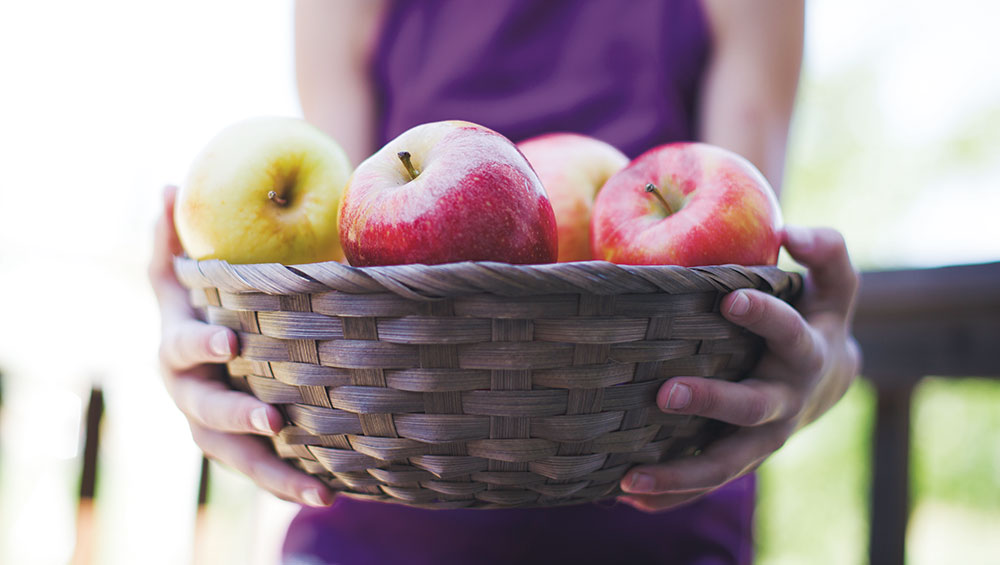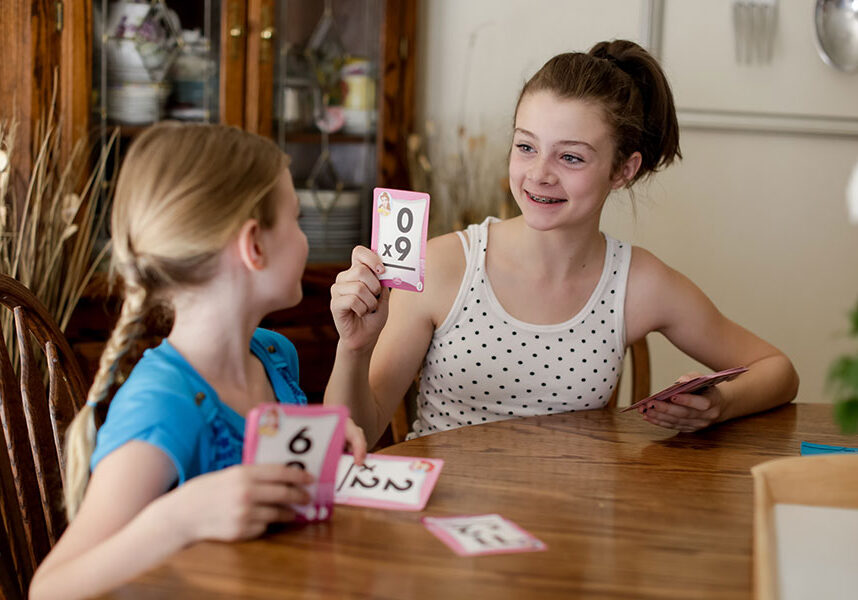Crisp air. Trees dressed in beautiful colors. Soon it will be autumn … and time for pickin’ apples, cookin’ apples, and eatin’ apples!
Munchy, crunchy, colorful, flavorful and good for your overall health, apples are amazing. They come in shades of red, green and yellow and taste sweet, tart or tangy. With 7,500 different kinds found around the world and 2,500 varieties being grown throughout the United States, it may be hard to choose a favorite!
Fact or fiction, symbolic or real, the apple plays a significant part in our lives. History shows that Stone Age man, nomadic hunters and gatherers, and New World explorers all attached special meaning to the apple to symbolize varied aspects of human existence: love, beauty, pleasure, wisdom, temptation, fertility, and more.
Clearly apples intrigue us. The American legend of Johnny Appleseed (see sidebar) pays homage to the apple. Two states, Arkansas and Michigan, have made the apple blossom their state flower. New York City is nicknamed “The Big Apple.” Songs include: “Apple of My Eye,” “Little Green Apples,” and “Apple Blossom Time.” The Swiss legend of William Tell includes the apple. School children bring apples to their teachers, and we play games like dunking for apples with them.
Besides being a tasty treat, apples contribute to good nutrition and health, validating the old adage “An apple a day keeps the doctor away.” Data gathered by scientists at University of California, Davis, and from Finland, the Netherlands and Switzerland, shows apples can benefit our health by:
- Reducing incidents of heart disease and cancer
- Lowering cholesterol
- Aiding in digestion
- Providing fiber, Vitamins A, B1, B2 and C, Niacin and minerals
- Controlling weight gain – apples are fat free, sodium free, cholesterol free and an average-sized apple is about 80 calories. Some classify apples as a “negative calorie” food, claiming they take more energy to digest than they provide in calories.
- Antioxidants in apples raise levels of acetylcholine, a neurotransmitter that’s essential to memory.
The apple is versatile: frozen, canned or fresh-picked; baked, dried or juiced. Eat them raw or cook them to make jelly, jams, applesauce or apple butter. Press 36 apples and make one gallon of cider. Peel two pounds of apples to bake a juicy apple pie, or boil to make a quart of applesauce.
The apple’s rich history, intriguing legends, multiple uses and good taste are what make apples special and will keep them part of our everyday lives. Enjoy!
Apple Facts
- Apples are grown all over the world. China is the leading apple growing country followed by the United States.
- The science of apple growing is called Pomology.
- Apple trees take 4 to 5 years to produce their first fruit. They grow 40 feet high and live over 100 years.
- Apples can be as small as cherries or as large as grapefruits.
- The largest apple ever recorded weighed three pounds.
- Individually, Americans eat about 19.5 pounds of apples every year.
- Most apples are still picked, the old fashioned way–
by hand. - Apples float because 25% of their volume is air.
The Origin of the Apple
Apples are thought to have originated in Central Asia, on the slopes of the Heavenly Mountains of Kazakhstan, near the city of Almaty which means “Father of Apples.” From there, seeds and cuttings made their way across the Atlantic Ocean with European explorers, who planted orchards all along the eastern seaboard. Pioneers then took seeds and cuttings from these orchards to the Midwest and West.
Upcoming Local Apple Events
Sat., October 1 (10am-5pm) & Sun., October 2 (10am-4pm): Johnny Appleseed Days in Butte County’s Paradise is California’s oldest harvest festival (128 years!) and a family tradition celebrating local apple history. Kids of all ages will love playing games and meeting “Johnny Appleseed” as he shares stories. The fun includes entertainment, vendors, delicious food, and of course, homemade apple pie! Admission is free. Held at Terry Ashe Park, 6626 Skyway. http://www.paradisechamber.com/johnny-appleseed-days. (530) 877-9356.
Sat., October 1 (9am-4pm): Celebrate everything about apples at the 24th annual Manton Apple Festival in northeastern Tehama County. Features over 100 artisan-created art, craft & food booths, live music on two stages, kids’ arts & craft activities, carriage rides, contests and games … it’s a day of fun for the whole family! All ages can enter the festival’s much-anticipated apple pie contest. Free admission and parking; festival proceeds support community projects & scholarships. Manton Elementary School, 31345 Forward Rd. http://www.mantonapple.com; (530) 474-4709.
Sat., October 8 (10am-11pm): The annual Apple Harvest Festival in Siskiyou County’s historic town of McCloud features plenty of family fun. Fresh-pressed apple juice, kids activities, artisan craft vendors, scarecrow and apple pie contests, music, vendors¸ games, food and drink. The celebrating takes place on Main Street. Admission is free from 10am-6pm. Dinner 6-7pm ($15); Dance 7-11pm ($5). (530) 964-3113.
Johnny Appleseed
Johnny Appleseed is the legendary American who planted apple trees throughout our country. Many believe him to be a fictional character, grown out of American folklore, but he was born in Leominster, Massachusetts, on September 26, 1774. His real name was John Chapman. He was a skilled nurseryman who owned nurseries in Ohio, Pennsylvania, Kentucky, Illinois and Indiana. He grew trees and supplied apple seeds to the pioneers in the mid-western states. Although he was a very successful businessman, he lived a simple life. He preferred to travel, spreading his love for apples trees around the country, and did so for 50 years.
Posted in: Community
Comment Policy: All viewpoints are welcome, but comments should remain relevant. Personal attacks, profanity, and aggressive behavior are not allowed. No spam, advertising, or promoting of products/services. Please, only use your real name and limit the amount of links submitted in your comment.
You Might Also Like...

Does Your Home Feel Imperfect? Congratulations!
When my husband suggested we move the old, blocky, wood veneer table from his bachelor condo to our shared home, I agreed, mainly because I assumed we’d replace it soon […]
Capturing Birthday Memories with a Photo Booth
Birthday parties are a special time to create photo memories that will last forever. However, children’s parties are notoriously chaotic and it can be hard to juggle kids, presents, games […]
The Crash Reel: Kevin Pearce’s Journey To Recovery
With the rising expectations of sports and the public’s desire to see athletes perform the most daring, seemingly impossible feats, the rate of sports-related brain injuries is increasing. A traumatic […]

Gymnastics in the North State
Raising the Bar For the Ross family, gymnastics started almost 15 years ago as a diversion tactic, a way to occupy three-year-old Reid during his older sister’s dance lessons in […]




